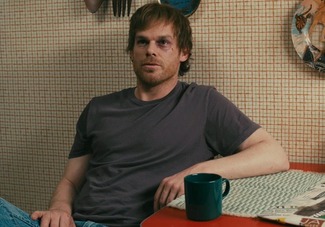
Director Michael Knowles aptly delivers a lighthearted comedy sure to become an indie favorite. It is, however, refreshing that The Trouble With Bliss (based on Douglas Light’s novel, East Fifth Bliss) is told without the heavy-handed philosophical musing that so often accompanies smart, independent films. Set in New York City and centered on Morris Bliss (played by Dexter’s Michael C. Hall) and his extremely colorful (though thankfully, not too quirky) cast of family, friends and love interests, Knowles’s third feature film is about the hilariously complicated art of growing up … as a grownup.
Morris Bliss represents the lovable underachiever in us all. He is the kind of guy with push-pins scattered across a world map on his wall, representing the places he’s only read about in his favorite literary classics. An unemployed 35-year-old who lives with his widowed, disapproving father (Peter Fonda), Bliss’s life gets some much-needed rattling from an overly precocious 18-year-old named Stephanie, played by Brie Larson. The film opens with the rhythmic sound of a creaking mattress heard over a black screen, eventually revealing a long-legged, big-eyed, dirty-blonde girl bouncing merrily away on a bed while Bliss stares unblinkingly at her. He looks astonished (and a bit uncomfortable), both by the girl herself as well as at finding himself in this particular situation. He becomes even more uncomfortable—and hilarity ensues—when he discovers that Stephanie’s father is an old high school buddy (sort of).
The Trouble With Bliss revolves around the main character’s relationships to the beautifully bizarre people in his life. Strange sexual undertones abound with Stephanie and are further complicated by Bliss’s hot (and married) neighbor, Andrea (played by a very underrated Lucy Lui). When his best friend NJ (Chris Messina) is introduced, the two buddies look a bit like the grown-up version of Napolean Dynamite and Pedro. NJ shows up after having disappeared for a week and matter-of-factly explains to Bliss (as the flashback unfolds on-screen) that he almost eloped but had to leave the (almost) woman of his dreams in her wedding dress at a buffet in Harlem. Without revealing too much, suffice it to say a large plate of rice and beans was involved (fitting in a film that also functions as yet another tribute to the Big Apple), and the story was unforgettable.
The character of Bliss is purposely written to be passive and indecisive (throughout most of the film), and Hall plays this well (reminding one of a younger Phillip Seymour Hoffman). But, as a result, the over-the-top (yet on-point) performances of the supporting cast threaten to overwhelm Bliss’s role as the protagonist of his own story. (They certainly are more memorable.)
Although Knowles packages the story almost too neatly (nearly all of the protagonist’s issues are resolved by story’s end), some mystery remains. Full of weirdness, wonder and, best of all, authenticity, The Trouble With Bliss delivers a truly idyllic experience.
Director: Michael Knowles
Writer: Douglas Light (novel), Michael Knowles
Starring: Michael C. Hall, Peter Fonda, Lucy Lui
Release Date: Mar. 23, 2012